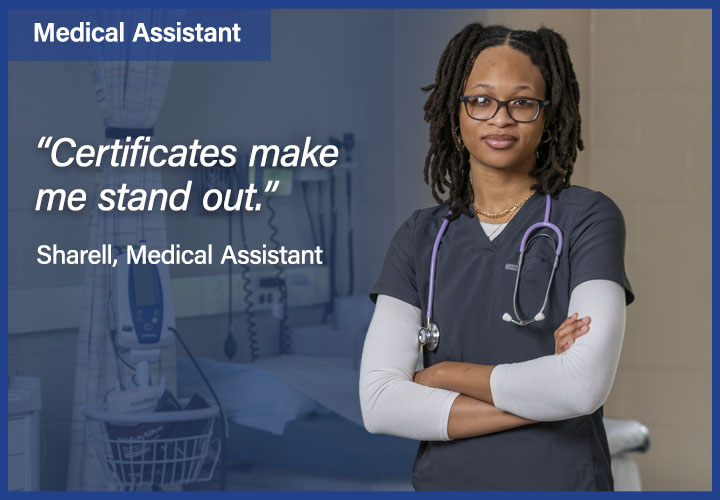Minimal time with maximum potential
It’s a given: the shortest way from point A to point B is a straight line. If your point B is immediate employment in a good-paying job, a certificate program offers you a straight line to get there!
Our Workforce and Continuing Education (WCE) noncredit certificate programs are the shortest in length, from five weeks to a few months, and are not scheduled within a traditional college semester.
Academic certificate programs let you earn credits that can be applied toward an associate degree. And can usually be completed in one or two college semesters, taken successively or spread out.
Both pathways lead to great jobs—fast. Our expert faculty are leaders in their fields who understand today’s job market and what employers want. They teach the skills that matter, so you’re ready to get hired with confidence.
In this video, we highlight in-demand careers you can earn with just a certificate.
Certificate Options
Short-term but far-reaching
To best prepare you for immediate employment, all of our WCE programs include on-the-job experience. Learning by doing ensures that when you’re hired, you’ll know exactly what’s expected of you and how to do it!
Some WCE certificate programs also provide a pathway to an academic program. A great option if you decide later that an academic certificate or associate degree will benefit your career.
When you complete one of our WCE certificate programs you’re prepared to start work the next day. And many of our students do just that, often with an assist from their instructors or our Career Services team who helped them find that first job in their new field.
Certificate Programs for Employment/Advancement:
- Administrative Assistant
- Basic Computer Skills
- Controls Technician
- Data Analyst
- Dental Assisting
- Digital Marketing
- Entrepreneurship
- Environmental Horticulture
- Floral Design
- Health and Wellness
- Landscape Design
- Marine Technician
- Medication Aide
- Pharmacy Technician
- Photographic Arts
- Project Management
- Robot Technician
- Veterinary Assistant
- Workplace Computing
Certificate Programs Preparing for State/National Licensure/Exams
- Builder's Pre-License
- Certified Medical Reimbursement Specialist
- Court Reporting
- EKG Technician
- Laboratory Assistant
- Nursing Assistant
- Personal Fitness Trainer
- Phlebotomy
- Professional Coding Preparation
- Registered Behavior Technician
Please note: Not all certificate programs are offered every term.
For more information, contact Workforce and Continuing Education at:
- Business & Information Technology and ESL: 586.349.8749 or WCEBIT@macomb.edu
- Engineering & Advanced Technology: 586.498.4100 or workforcedev@macomb.edu
- Health & Public Services/Center for Health Careers: 586.226.4807 or healthcareers@macomb.edu.
- Public Service Institute: PSI@macomb.edu
Pathway toward a degree
In our academic certificate programs, you’ll take only the courses that apply directly to your field. But if you decide to earn an associate degree at a later date, you can always return to pick up the general education credits you’ll need to graduate.
Academic certificate programs are offered in a traditional class/semester format, and many include a hands-on component like those offered by WCE. Suggested course sequences for each program can be found in the college catalog, giving you a map toward your career goal.
Once you complete your program, Career Services is here to assist you in finding the first job in your new field. If you discover later on that you need a bachelor’s degree to advance, credits earned in our academic certificate programs transfer to a four-year college or university, with or without earning an associate degree first.
- Accounting
- Architectural Technology – Commercial Design and Construction
- Architectural Technology- Residential Design and Construction
- Automated Systems Technology - Mechatronics
- Automotive Technology – Automobile Service Technology
- Automotive Technology – Engine Machining
- Automotive Technology – Automotive Service Education Program (GM ASEP)
- Automotive Technology – Master Automotive Service Technology
- Automotive Technology – Maintenance and Light Repair
- Behavioral Sciences
- Business Management
- Civil Technology
- Climate Control Technology
- Climate Control Technology – Air Conditioning
- Climate Control Technology – Heating
- Climate Control Technology – HVAC Installation and Service Technician
- Climate Control Technology – Refrigeration
- Community Leadership
- Construction Management
- Criminal Justice
- Criminal Justice with Basic Police Academy
- Culinary Arts – Culinary Management
- Culinary Arts – Prep Cook
- Electronic Engineering Technology
- Emergency Medical Technician
- Emergency Medical Technician - Paramedic
- Entrepreneurship and Small Business Management
- Fire and Emergency Services Technology – Fire Academy
- Fire and Emergency Services Technology – Fire Science
- General Business
- Health & Wellness Coaching
- Homeland Security
- Information Technology – Data Analytics
- Information Technology – Database Programming
- Information Technology – Programming
- Information Technology – Programming for Electronic Games
- Information Technology – Website Programming
- International Business
- Marketing
- Marketing – Advertising
- Marketing – E-marketing
- Marketing - Professional Selling
- Media and Communication Arts – 3D Animation
- Media and Communication Arts – Collaborative Media
- Media and Communication Arts – Creative Imaging and Illustration
- Media and Communication Arts – Design and Layout
- Media and Communication Arts – Interactive Web Media
- Media and Communication Arts – Motion Design
- Media and Communication Arts – Photography
- Media and Communication Arts – Video Production
- Medical Assistant
- Music Performance
- Pastry Arts
- Pastry Arts – Assistant Baker
- Product Development – Computer Aided Design (CAD)
- Product Development – Digital Sculptor
- Robotics
- Surgical Technology
For more information about our academic certificate programs, email admissions@macomb.edu.



